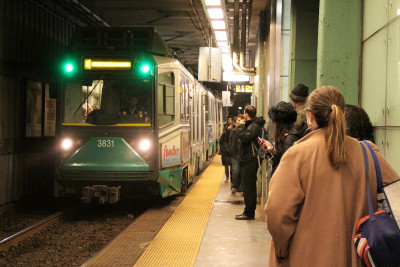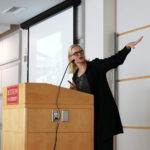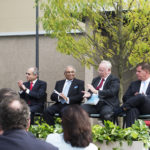
Seeking resident input to create the next five-year Capital Investment Plan, the Massachusetts Department of Transportation and Massachusetts Bay Transportation Authority hosted the first of 16 Capital Conversations on Monday at the State Transportation Building.
The 2017-2021 CIP is a “multi-modal unified plan” for highway, MBTA, railway and aeronautics projects, a Wednesday press release stated. There will be 16 meetings in various locations throughout Massachusetts through the first week of November.
MBTA General Manager Frank DePaola said the MBTA wants to create a more transparent, user-friendly model.
“We want to hear your concerns, priorities and ideas for the future transportation investment across the state and across all modes of transportation,” DePaola said at the meeting Monday. “What we learn here will help inform the 2017-2021 Capital Investment Program, prioritize lists of investments for our transportation system funded with available and federal and state resources. That process begins here tonight.”
MassDOT Secretary and CEO Stephanie Pollack expressed how excited the department is to host these sessions for the public.
“These meetings will help us to develop a comprehensive, data-driven document that strategically identifies and prioritizes transportation projects for the immediate future,” Pollack said in an Oct. 8 press release. “We look forward to robust participation by the public in the meetings.”
Instead of delivering materials through formal presentations, authorities organized the meeting in a conversational manner, enabling attendees to converse one-on-one with MassDOT and MBTA officials and subject matter experts.
“A lot of people came with the expectation to hear a presentation. That’s what we’ve always done,” said Rick Colon, a spokesman from MassDOT. “But this is different. This is about public input, we want to hear from you. So that’s why this format of answer, question and public input type meeting is the reason for this type of format.”
Colon also detailed some goals MassDOT hopes to achieve through these meetings and the Capital Investment Program.
“[We] hope for more reliability and I think we’re well on our way in respect to our Winter Resiliency Program with the MBTA and the rails,” Colon said. “I hope this Capital Investment Program will also offer more opportunity in a wide variety of different programs for commuters all across the state.”
During the meeting, attendees had the chance to put suggestions for transportation improvements into the provided database.
Scott Zadakis, 32, of Beacon Hill, responded positively towards the Capital Conversation.
“I think it’s a good step in the right direction because getting input from the public before they start to plan rather than bringing a plan to the public and asking for feedback on it,” he said. “I would like to see our physical trains and buses kept modern. Basically, just keep things working.”
Sam Wesselman, 26, of Somerville, suggested that the event is too informal.
“I like that you can go up and talk to people one-on-one and it’s maybe too informal,” he said. “I don’t know who to talk to in this event, but I think it’s better than people just talking at us.”
Marah Holland, 26, of Dorchester, said the Capital Conversations serve as a good opportunity for residents to converse with authorities.
“It was a good opportunity for residents to directly engage with MassDOT,” she said. “I think it could’ve been marketed better and advertised better. I feel there weren’t that many residents here.”
Other residents said they agreed that the idea of seeking public input is the way to best meet the needs of the community.
Dea Biancarelli, 20, a senior in Boston University’s Sargent College of Health and Rehabilitation Sciences, said she hopes the capital investments go toward improving the Green Line.
“The Green Line needs a lot of work. It’s old [and] it leaks,” she said. “Especially when it’s cold out, the buses don’t show up.”
Fatima Smith, 65, of Roxbury, she is concerned about how the transportation will operate during the winter.
“In the winter, my concern is the cleaning of the areas where people have to wait for public transportation, especially when it’s a snow emergency,” she said. “I feel it is the city’s responsibility to make sure to clean these areas out where people have to wait for public transportation. It’s nice they have meetings [to get] the public’s feelings on the transportation process.”




